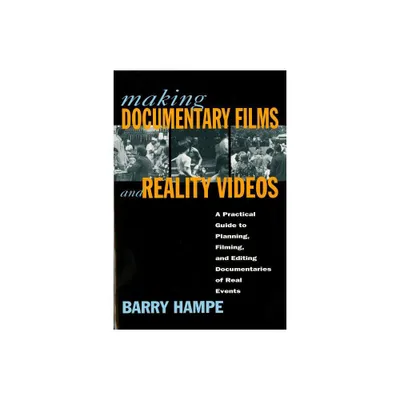Home
Documentary Film India: An Anthropological History
Loading Inventory...
Barnes and Noble
Documentary Film India: An Anthropological History
Current price: $190.00


Barnes and Noble
Documentary Film India: An Anthropological History
Current price: $190.00
Loading Inventory...
Size: Hardcover
*Product Information may vary - to confirm product availability, pricing, and additional information please contact Barnes and Noble
This book maps a hundred years of documentary film practices in India. It demonstrates that in order to study the development of a film practice, it is necessary to go beyond the classic analysis of films and filmmakers and focus on the discourses created around and about the practice in question. The book navigates different historical moments of the growth of documentary filmmaking in India from the colonial period to the present day. In the process, it touches upon questions concerning practices and discourses about colonial films, postcolonial institutions, independent films, filmmakers and filmmaking, the influence of feminism and the articulation of concepts of performance and performativity in various films practices. It also reflects on the centrality of technological change in different historical moments and that of film festivals and film screenings across time and space.
Grounded in anthropological fieldwork and archival research and adopting Foucault’s concept of ‘effective history’, this work searches for points of origin that creates ruptures and deviations taking distance from conventional ways of writing film histories. Rather than presenting a univocal set of arguments and conclusions about changes or new developments of film techniques, the originality of the book is in offering an open structure (or an open archive) to enable the reader to engage with mechanisms of creation, engagement and participation in film and art practices at large. In adopting this form, the book conceptualises ‘Anthropology’ as also an art practice, interested, through its theoretico-methodological approach, in creating an open archive of engagement rather than a representation of a distant ‘other’. Similarly, documentary filmmaking in India is seen as primarily a process of creation based on engagement and participation rather than a practice interested in representing an objective reality.
Proposing an innovative way of perceiving the growth of the do
Grounded in anthropological fieldwork and archival research and adopting Foucault’s concept of ‘effective history’, this work searches for points of origin that creates ruptures and deviations taking distance from conventional ways of writing film histories. Rather than presenting a univocal set of arguments and conclusions about changes or new developments of film techniques, the originality of the book is in offering an open structure (or an open archive) to enable the reader to engage with mechanisms of creation, engagement and participation in film and art practices at large. In adopting this form, the book conceptualises ‘Anthropology’ as also an art practice, interested, through its theoretico-methodological approach, in creating an open archive of engagement rather than a representation of a distant ‘other’. Similarly, documentary filmmaking in India is seen as primarily a process of creation based on engagement and participation rather than a practice interested in representing an objective reality.
Proposing an innovative way of perceiving the growth of the do


















